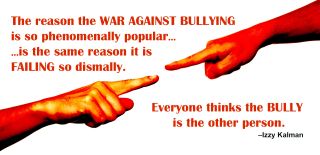Bullying
What We Should Learn About Bullying From Trump's Shooter
Rather than targeting bullies for eradication, we should be focusing on victims.
Updated July 18, 2024 Reviewed by Tyler Woods
Key points
- The man who attempted to assassinate Donald Trump is reported to have been a victim of bullying.
- The expectation that anti-bullying efforts will reduce serious violence is no longer tenable.
- To reduce violence, we need, instead, to be teaching people not to be victims.

The biggest news story of recent days is the attempted assassination of Donald Trump. Twenty-year-old Thomas Crooks only grazed his ear, but he did, sadly, kill another man and critically injure two others. As we have come to expect when hearing news of mass shootings, this perpetrator is reported to have been a victim of bullying.
The war against bullies
The massive campaign to rid schools and society of bullies is now fully a quarter of a century old. It was launched in response to the Columbine High School massacre of April 20, 1999, which was committed by two young men who presented themselves as victims of bullying. Researchers who studied previous school shootings discovered that the majority of perpetrators were victims of bullying. It had been known even longer that many kids who die by suicide do so to escape the misery of being bullied. People who are victimized for a long time often develop a dark side, fed by years of degradation by their peers that drives them to seek power, revenge, and possibly notoriety. In extreme cases, they may also have a suicidal motive, expecting to be put out of their misery by law enforcement officers responding to their deadly action.
In order to prevent such tragedies from recurring, the psychological and educational establishments declared a war against bullying with the expectation that it would prevent people from being victimized, and thereby obviating any need to engage in violence. It was also expected that anti-bullying education would result in a generally more peaceful society.
What we know thus far of Trump's would-be assassin
At the time of this writing, Thomas Crook's specific motives for shooting Trump are not yet known, and we may never know them. One thing we do know, though, is that both his parents were licensed mental health counselors. It is likely they knew more about him and his problems, including the bullying, than anyone else. We should give them the benefit of the doubt and assume that they cared about him, strove to be good, enlightened parents, and tried to coach him for social success. Maybe they even sent him to the school counselor or an outside private therapist for help.
The failure of anti-bullying education
Nevertheless, any such efforts, whether by Thomas's parents, school, or mental health providers he may have seen, obviously failed in a big way. This should not surprise us. It is an unfortunate truth that most psychological professionals do not have a reliable way to get kids to stop being bullied. After 25 years and the all-too-frequent news of fatal shootings, it's time to acknowledge that anti-bullyism has not been working.
This writer has warned all along that it can't possibly work–that the way we go about addressing bullying will promote a victim mentality and actually cause more harm than good. An earlier article presents in detail possible reasons for the failure of antibullying interventions.
A major reason for anti-bullyism's failure is its most basic message: that we have a right to a life without being bullied, and if we are being bullied, it is only the fault of the bully.
The bullying experts' expectation was that the message not to be bullies would convince us to stop treating others badly. The problem is that hardly anyone thinks they are bully. Even Donald Trump, who has been routinely dubbed by the media as a bully—and much worse—denies that he is a bully.

We all see the other person as the bully and ourselves as the victims. Thus, we think that messages not to be bullies don't refer to us, but to those we perceive as bullying us. If society fails to stop them, some of us decide to take matters into our own hands. We should not be surprised if new information reveals that the young Mr. Crooks indeed saw Trump as an evil bully endangering the world, and that he was trying to save us from him.
A better approach
What, then, can we do to prevent serious violence? We first need to realize that the most dangerous people are not bullies but victims. Bullies are not looking to kill. They want power; they enjoy putting others down and intimidating them. But they are not looking to kill. One cannot continue enjoying upsetting people once they are dead. Bullies need living victims.
To make society safer, we need to teach people not to be victims. Victims are the ones who are burning with anger and desire for revenge. They are the ones who shoot up schools, workplaces, places of worship, concert halls and political events. They are the terrorists who feel justified bringing nations to their knees by randomly blowing up their citizens. It's victims that we don't want people to be.
When people learn how not to be victims, they can stop being bullied. The darkness leaves their hearts, and the rest of us become safer.
This is what good psychology, as well as ancient wisdom, has always been about. It has never been about teaching us to blame others for our misery, but to take responsibility for our problems and learn to overcome them. It is not impossible to do, and has a much better likelihood of success than promoting the idea that bullies have no place in society.




